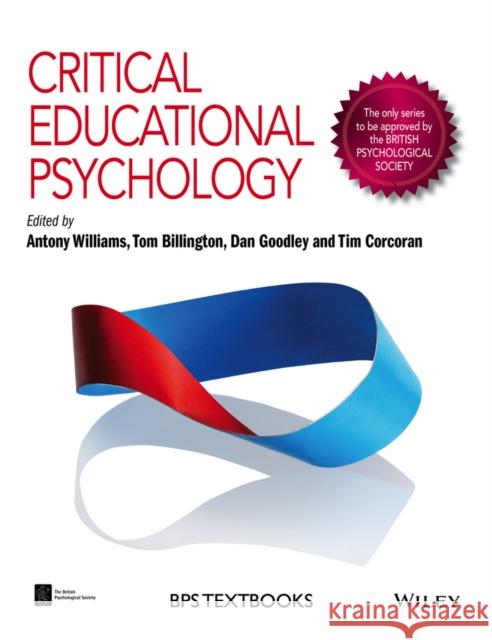Critical Educational Psychology » książka



Critical Educational Psychology
ISBN-13: 9781118975947 / Angielski / Miękka / 2016 / 256 str.
Critical Educational Psychology
ISBN-13: 9781118975947 / Angielski / Miękka / 2016 / 256 str.
(netto: 180,32 VAT: 5%)
Najniższa cena z 30 dni: 188,17
ok. 30 dni roboczych.
Darmowa dostawa!
The first textbook of its kind, Critical Educational Psychology is a forward-thinking approach to educational psychology that uses critical perspectives to challenge current ways of thinking and improve practice.
List of Contributors iv
1 Introduction: Educational Psychology – towards a human science 1
Antony Williams, Tom Billington, Dan Goodley and Tim Corcoran
Part I: Reflexive Foundationalism: Critical Psychological Resources 14
2 Psychology and Education: Unquestionable goods 15
Ansgar Allan
3 Ontological constructionism 27
Tim Corcoran
4 What use is a story? Narrative, in practice 37
Penny Fogg
5 Postconventionalism: Towards a Productive Critical Educational Psychology 49
Dan Goodley
6 Psychoanalysis 59
Antony Williams
Part II: Ethics and Values and their implications for Practice 69
7 Critical educational psychology and disability studies: Theoretical, practical and empirical allies 70
Dan Goodley and Tom Billington
8 Thinking critically about professional ethics 89
Pat Bennett
9 The Ethical Demand in an Impossible Profession 99
Niall Devlin
10 EP becoming phronimos: the virtue of phronêsis in educational psychology 112
Daniela Mercieca and Duncan P. Mercieca
11 Traversing the expert non–expert binary: the fluid and contested nature of expertise 122
Catherine Beal
12 Joining the Q: What Q methodology offers to a critical educational psychology 134
Martin Hughes
13 Are we all psychologists now? 145
Antony Williams
Part III: Putting critical psychological resources to work in Educational Psychology 153
14 Epidemic or psychiatrization? Children’s mental health in a global context 154
China Mills
15 The Teacher’s Role in Supporting Student Mental Health and Wellbeing 165
Helen Monkman
16 Towards Restorative Justice 177
Vicki Harold
17 Faith and Educational Psychology: Empowering Islamic Perspectives of Muslim Parents 189 Samana Saxton
18 Gender, Non–normativity and Young Women who have been Excluded 199
Dawn Bradley
19 A Mindful Educational Psychology Practice 209
Sahaja Davis
20 Some Reflections on Educational Psychology Practice 218
Majid Khoshkhoo
21 Finding attunement and promoting positive attachments 228
Kathryn Pomerantz
22 Social Theatre for Social Change: The Relevance of Performance Art in Educational Psychology 239 Nick Hammond
23 ‘Being’ dyslexic in higher education: reflections on discourse and identity 250
Harriet Cameron
24 A future? Why educational psychologists should engage with a critical neuroscience 260 Tom Billington
Antony Williams is the Academic Director for the Doctorate in Educational and Child Psychology at the School of Education at the University of Sheffield, UK. He also works as a practicing educational psychologist. His research interests are focused in the area of subjectivity and intersubjectivity, with a particular interest in how psychoanalytic concepts and theory may inform as well as potentially disturb psychological practice.
Tom Billington is Professor of Educational and Child Psychology at the School of Education at the University of Sheffield, UK. A critical psychologist, practitioner and academic, his research focuses on the nature of psychological work conducted with young people and the theoretical bases upon which practice is justified, in particular in the fields of autism and child protection, utilizing qualitative research methodologies, primarily discourse analytic, psychodynamic and narrative approaches. His books include
Working with Children: Assessment, Representation, and Intervention (2006),
Children at the Margins: Supporting Children, Supporting Schools (2004), and
Separating, Losing, and Excluding Children: Narratives of Difference (2000).
Dan Goodley is Professor of Disability Studies and Education at the School of Education at the University of Sheffield, UK. He directs the Masters in Psychology and Education, and teaches in the Doctorate of Education and the undergraduate Education, Culture and Childhood programs. His research interests include critical disability studies, critical psychological and sociological theory, and non–normative childhoods. He is the author or editor of many books in the field, including, most recently,
Dis/ability Studies: Theorising Disablism and Ableism (2014),
Disability and Social Theory (2012), and
Disability Studies: An Inter–disciplinary Introduction (2011).
Tim Corcoran is Senior Research Fellow and Senior Lecturer in Critical Psychology at The Victoria Institute, Victoria University, Melbourne, Australia. He has extensive experience in educational psychology as a school psychologist and researcher/academic. His work has involved teaching, research and professional practice in Australia, the UK, Singapore and Iraq. He edited
Psychology in education: Critical theory∼practice (2014), an international collection of contributions examining critical approaches to educational psychology. More recently he co–edited
Disability studies: Educating for inclusion (2015).
The first textbook of its kind,
Critical Educational Psychology is a forward–thinking approach to educational psychology that uses critical perspectives to challenge current ways of thinking and improve practice. Written by practitioners engaged in theory, this text uses a broad range of theoretical resources from outside mainstream psychology to examine issues at the forefront of educational psychology. The chapters discuss the role of education, the relationship between teaching and learning, the impact of gender, faith and ethics in educational settings, the construction of rich learning environments, and notions of normalcy, difference, and disability. Contributors employ phenomenology, poststructuralism, psychoanalysis, discursive psychology, social constructionism, narrative psychology, disability studies theory, among other theoretical resources.
This serves as a foundational text for trainees in educational and school psychology as well as an essential resource for those practicing and researching in those fields and related ones across psychology and education. Students will benefit from pedagogical features, such as discussion points, mini exercises, essay questions, key terminology, theoretical starting points, and further readings. By calling into question and reconceptualizing traditional models, this text illuminates an exciting new frontier in educational psychology.
1997-2026 DolnySlask.com Agencja Internetowa
KrainaKsiazek.PL - Księgarnia Internetowa









